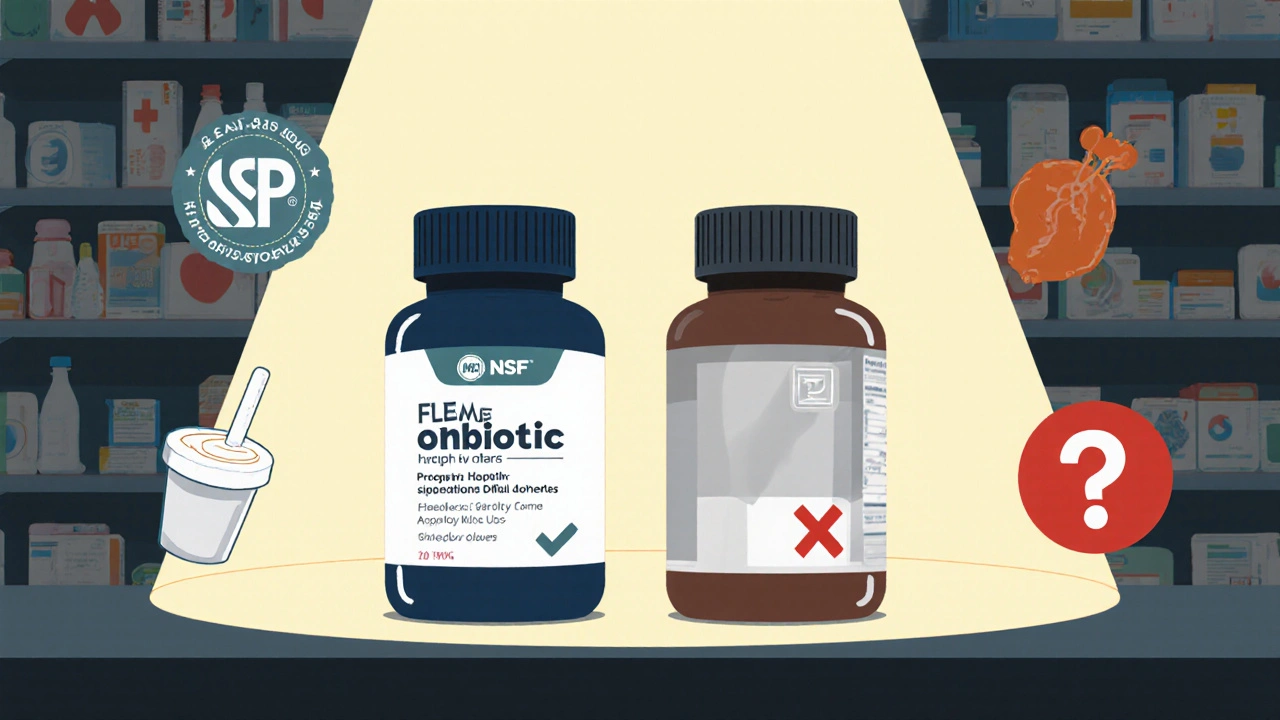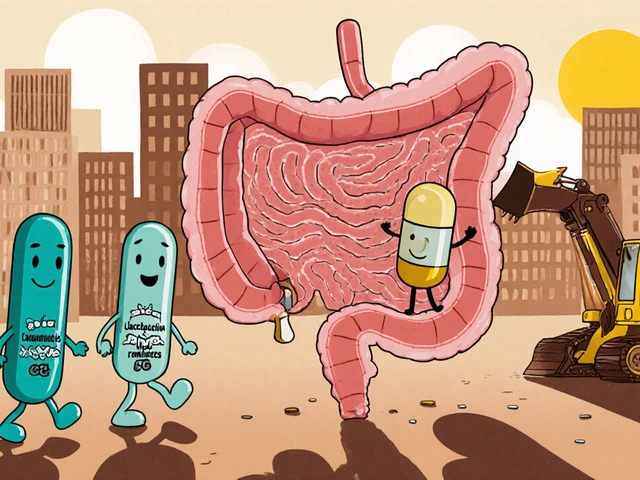When you hear the word probiotics, you might think of yogurt commercials or a shelf full of colorful bottles in the supplement aisle. But what do they actually do? And does the science back up the hype? The truth is, probiotics aren’t magic. They’re live bacteria-tiny organisms living inside you right now-and some of them might help your gut work better. But not all probiotics are the same. And not every bottle on the shelf does what it claims.
What Probiotics Really Are (And What They’re Not)
Probiotics are live microorganisms that, when taken in the right amount, can give you a health benefit. That’s the official definition from the International Scientific Association for Probiotics and Prebiotics (ISAPP). It’s not just any bacteria. It’s specific strains-like Lactobacillus rhamnosus GG or Saccharomyces boulardii-that have been studied in clinical trials. Many products just say “contains probiotics” without naming the strain. That’s like saying a car has an engine, without telling you if it’s a V6 or a diesel.
The idea isn’t new. Back in the early 1900s, scientist Élie Metchnikoff noticed Bulgarian peasants who ate fermented milk lived longer. He guessed it was the lactic acid bacteria. Today, we know more. Your gut holds about 100 trillion bacteria from over 1,000 species. Most of them are harmless or helpful. Probiotics aim to support that balance-not replace it.
Where Probiotics Actually Work (The Evidence)
Not all digestive problems respond to probiotics. But for some, the data is strong.
Antibiotic-associated diarrhea is one of the clearest cases. When you take antibiotics, they don’t just kill bad bacteria-they wipe out good ones too. That can lead to loose stools. A review of 12 studies involving nearly 1,500 people found that taking probiotics like Lactobacillus rhamnosus GG (LGG) at doses of 4 billion to 12 billion CFU daily cut the risk of diarrhea from 22% down to 12%. That’s a 45% drop. And the best part? You need to take them at least two hours apart from your antibiotic, and keep going for a week or two after you finish the course.
Acute infectious diarrhea-the kind you get from food poisoning or viruses-is another area where probiotics shine. A Cochrane Review of 82 studies with over 12,000 mostly children showed that probiotics reduced the risk of diarrhea lasting more than two days by 36%. LGG and Saccharomyces boulardii were the most effective, shortening the illness by about a day on average.
Ulcerative colitis (a type of inflammatory bowel disease) also shows some benefit. A 2020 review by the American Gastroenterological Association found that specific probiotics, especially VSL#3 (a multi-strain mix), helped maintain remission in mild to moderate cases. But for Crohn’s disease? No clear benefit. And for acute pouchitis? Probiotics are actually not recommended.
Where Probiotics Fall Short
Don’t expect miracles for everything.
Irritable bowel syndrome (IBS) is tricky. Some people swear by probiotics for bloating and cramps. Others feel nothing. Studies are mixed. A few strains-like Bifidobacterium infantis 35624-show modest improvement in symptoms, but others don’t. The problem? IBS isn’t one condition. It’s a group of symptoms with different causes. What helps one person might do nothing for another.
General “gut health” claims like “boosting immunity” or “detoxing your system”? There’s no solid proof. The European Food Safety Authority (EFSA) rejected hundreds of health claims on probiotic labels because the evidence wasn’t good enough. Only yogurt cultures (like Streptococcus thermophilus and Lactobacillus bulgaricus) got approval-for helping people digest lactose.
And here’s the hard truth: if you’re healthy and eating well, you probably don’t need probiotics. Your gut already has a thriving ecosystem. Supplements won’t make it better-they might just add noise.

Strain Matters More Than Brand
Not all Lactobacillus acidophilus is the same. There are over 20 different strains of this one species. LA-1, LA-5, NCFM, DDS-1, SBT-2026-they each behave differently. One might help with lactose intolerance. Another might reduce inflammation. Another might not do anything at all.
That’s why you can’t just pick a bottle because it says “10 billion CFU.” You need to know the strain. Look for products that list the exact strain name on the label. If it doesn’t, skip it. Most cheap supplements don’t even contain what they claim. A 2019 test by ConsumerLab found 30% of probiotic products had fewer live bacteria than advertised.
Stick to brands with third-party verification-USP, NSF International, or ConsumerLab. These groups test for potency, purity, and whether the product actually contains what’s on the label.
How to Take Them Right
Timing and storage matter.
- If you’re on antibiotics, take probiotics at least two hours before or after your dose. That way, the antibiotic doesn’t kill the good bacteria before they can settle in.
- Some probiotics need refrigeration (like VSL#3). Others, like Saccharomyces boulardii, are shelf-stable. Check the label.
- Don’t expect instant results. Most people notice changes after 2-4 weeks. Some take up to 8 weeks. The first few days might bring extra gas or bloating-that’s normal. Your gut is adjusting.
Also, don’t assume more CFUs = better. For LGG, 10 billion CFU is the proven dose for diarrhea. Taking 50 billion won’t make it work faster. It just costs more.

Who Should Avoid Probiotics
For most people, probiotics are safe. But not everyone.
If you’re severely ill, have a weakened immune system, or are in the ICU, probiotics can be risky. There are rare case reports of people developing infections from the very bacteria meant to help them. That’s why doctors don’t recommend them for hospitalized patients or those with central lines or catheters.
Also, if you have small intestinal bacterial overgrowth (SIBO), probiotics might make bloating worse. Talk to your doctor first.
What’s Next for Probiotics
The future isn’t one-size-fits-all bottles. It’s personalized. Companies like Viome and Thryve now offer gut microbiome tests and then recommend probiotic blends based on your unique bacteria profile. It’s early days, but the science is moving toward precision probiotics-targeting specific conditions with specific strains.
Research is also looking at how certain strains affect metabolism. A 2024 study found some probiotics might help regulate blood sugar and insulin sensitivity. That could open doors for managing prediabetes. But we’re not there yet.
For now, the best advice is simple: if you have antibiotic-associated diarrhea or acute infectious diarrhea, especially in kids, probiotics are worth trying. Pick a strain with proven results. Take it correctly. Give it time. And if you’re just feeling a little bloated or “off”? Try eating more fiber, fermented foods like kimchi or kefir, and cutting back on processed sugar. Sometimes, the best probiotic isn’t in a pill-it’s in your fridge.
Market and Regulation: What You’re Really Buying
The global probiotic market hit $50.2 billion in 2022 and is expected to grow to nearly $90 billion by 2030. North America and Europe lead the charge. But regulation? It’s a mess.
In the U.S., the FDA doesn’t approve probiotics as drugs. They’re sold as supplements, so companies don’t need to prove they work-just that they’re safe. That’s why you see claims like “supports digestive health” everywhere. It’s a legal loophole.
Canada and Italy are stricter. They allow claims about supporting a healthy gut microbiota if backed by science. In the U.S., only yogurt cultures got a qualified health claim-for lactose digestion.
And here’s the kicker: 74% of people who use probiotics say they feel better. But 26% don’t notice anything. That’s the reality. It works for some. Not for others. And until you know the strain, dose, and condition you’re targeting, you’re guessing.
Do probiotics help with bloating?
Some probiotics can help with bloating, especially in people with irritable bowel syndrome (IBS). Strains like Bifidobacterium infantis 35624 and Lactobacillus plantarum DSM 9843 have shown modest benefits in clinical trials. But results vary widely. Many people see no change. If bloating is your main issue, try a strain-specific product for at least 4-8 weeks before deciding if it works.
Can I get probiotics from food instead of supplements?
Yes. Fermented foods like yogurt (with live cultures), kefir, sauerkraut, kimchi, miso, and kombucha naturally contain probiotics. They often have a wider variety of strains than supplements. Plus, they come with fiber and nutrients. For general gut support, eating these foods regularly is a smarter, cheaper move than popping pills.
Are probiotics safe for kids?
For healthy children, yes-especially for preventing or treating antibiotic-associated diarrhea or acute infectious diarrhea. Lactobacillus rhamnosus GG (LGG) is the most studied and recommended strain for kids. Doses around 10 billion CFU daily have been shown to be safe and effective. Always check with a pediatrician before starting any supplement.
How long should I take probiotics?
For acute issues like diarrhea, take them for the duration of the illness plus a week or two after. For chronic conditions like IBS or ulcerative colitis, ongoing use may be needed to maintain benefits. If you stop, the effects usually fade within weeks. There’s no standard duration-depends on your goal and the strain.
Do probiotics need to be refrigerated?
Some do, some don’t. Lactobacillus and Bifidobacterium strains are often sensitive to heat and moisture, so refrigeration helps them survive. But Saccharomyces boulardii is a yeast and stays stable at room temperature. Always check the label. If it says “refrigerate,” don’t leave it on your kitchen counter.
What’s the difference between probiotics and prebiotics?
Probiotics are the live bacteria. Prebiotics are the food those bacteria eat-mostly fiber like inulin, chicory root, or resistant starch. You can take them together (called synbiotics), but they’re not the same. Prebiotics help your own good bacteria grow. Probiotics add new ones. Both support gut health, but in different ways.
Can probiotics help with weight loss?
There’s no strong evidence that probiotics cause weight loss in humans. Some animal and early human studies suggest certain strains might influence metabolism or fat storage, but results are inconsistent. Don’t buy a probiotic for weight loss. Focus on diet, sleep, and movement instead.
If you’re considering probiotics, start with a clear goal: Are you recovering from antibiotics? Dealing with travel-related diarrhea? Managing IBS? Then pick a strain with proven results for that condition. Skip the hype. Check the label. Be patient. And remember-your gut doesn’t need fixing if it’s not broken.


Andrew Camacho
November 25, 2025 AT 19:20Probiotics are basically the wellness industry’s answer to ‘I don’t wanna change my diet’ - pop a pill and pretend your gut’s a magic box. The science? Sure, it works for antibiotic diarrhea. But 90% of the bottles on Amazon? Total snake oil. I’ve seen brands claim ‘50 billion CFU’ and then test with 2 billion. And don’t even get me started on ‘gut detox’ nonsense. Your liver does that. No pill needed.
Erika Hunt
November 26, 2025 AT 07:33I’ve been taking LGG for months now, after my last round of antibiotics, and honestly? I feel… different. Not magically better, but my bloating? Gone. My digestion? Smoother. I didn’t expect it to work, and I almost stopped after two weeks because nothing happened - then, one morning, I realized I hadn’t had gas all day. That’s when I knew. It’s not about instant results. It’s about consistency. And yes, strain matters - I read the label like it’s a contract. If it doesn’t say Lactobacillus rhamnosus GG? Back on the shelf.
Sharley Agarwal
November 26, 2025 AT 16:50Probiotics are a scam for people who don’t want to eat vegetables.
prasad gaude
November 28, 2025 AT 14:09In India, we’ve been eating fermented foods for centuries - dosa batter, idli, kanji, pickles - and no one ever needed a $40 bottle labeled ‘premium probiotic.’ The wisdom of our grandmothers? They didn’t need CFU counts. They knew food was medicine. Now we chase pills because we’ve forgotten how to cook. The real probiotic? A bowl of homemade yogurt with a pinch of salt and a dash of patience.
And yes, I’ve seen my uncle, 78, take nothing but curd and turmeric - no supplements - and walk 10 km daily. The gut doesn’t need fixing. It needs feeding.
Srikanth BH
November 29, 2025 AT 00:42Don’t write off probiotics just because they’re not magic. They’re tools - not cures. If you’re on antibiotics, take them. If you’ve got chronic bloating and your doctor says IBS, try a strain-specific one for 60 days. No hype. No guilt. Just data. And if it doesn’t help? That’s okay. Your body’s not broken. You just didn’t find the right key. Keep trying. You’re not failing. You’re learning.
Jennifer Griffith
November 29, 2025 AT 04:49so probiotics are just like, vitamins but for your butt? lol. i took one once and i swear i farted for 3 days straight. also, why do they all cost like $30? my yogurt is 2 bucks. also, i think they just make you poop more. that’s it.
Shirou Spade
November 30, 2025 AT 20:02There’s a quiet irony here - we’ve spent centuries evolving alongside microbes, and now we think we can engineer our way back into balance with a capsule. The gut isn’t a broken machine. It’s a civilization. You don’t fix a city by dropping in a few new citizens. You fix it by cleaning the streets, feeding the people, and silencing the noise. Probiotics? Maybe. But fiber? That’s the real revolution.
Patricia McElhinney
December 1, 2025 AT 09:12As a clinical nutritionist with 22 years of experience, I must emphasize: the FDA’s regulatory vacuum for probiotics is a public health crisis. Consumers are being misled by predatory marketing. The term ‘probiotic’ is unregulated, unstandardized, and often unverifiable. Third-party testing is not optional - it’s mandatory for ethical consumption. And yet, 74% of products fail potency testing. This is not wellness. This is exploitation.
Pallab Dasgupta
December 2, 2025 AT 21:50Bro. I used to be skeptical too. Then I had that food poisoning in Goa - 3 days of hell. I took Saccharomyces boulardii on day two. By day three? I was eating street food again. No joke. I didn’t even need meds. That’s when I realized - science isn’t just in labs. It’s in your gut. And yeah, I still eat kimchi every morning. But now? I also keep a bottle in my bag. For emergencies. Because sometimes, life doesn’t wait for you to ferment your own cabbage.
Ellen Sales
December 3, 2025 AT 13:20I’ve been thinking… what if the real problem isn’t that we’re missing good bacteria - but that we’re killing our own? Sugar, processed food, stress, antibiotics, even hand sanitizer… we’ve built a world that starves our microbiome. Probiotics are like putting a Band-Aid on a broken pipe. The real fix? Stop pouring poison down the drain. Eat real food. Sleep. Breathe. Walk. Let your gut heal itself. The supplement? Just a gentle nudge. Not a rescue mission.
And honestly? I don’t even buy probiotics anymore. I make my own sauerkraut. It’s cheaper. And I feel like a wizard.
giselle kate
December 3, 2025 AT 16:39Probiotics are a Big Pharma distraction. They want you to think your gut’s broken so you’ll buy their pills. Meanwhile, glyphosate is in your water, your bread, your damn oat milk. The real enemy? Industrial agriculture. The real cure? Organic food. Local. Unprocessed. Not some lab-grown bacteria in a plastic bottle made in China.
Shivam Goel
December 3, 2025 AT 17:41Let’s talk about CFU. Everyone obsesses over the number - ‘10 billion!’ ‘50 billion!’ - but here’s the thing: most of those bacteria die before they reach your colon. The real metric? Viability. Stability. Delivery system. Enteric coating? Yes. Delayed release? Yes. But most cheap brands? No. Just powdered junk in a capsule that dissolves in your stomach. You’re paying for dead bacteria. That’s not a supplement. That’s a placebo with a fancy label.
And don’t even get me started on ‘multi-strain’ products. It’s like throwing 17 different drugs into one pill and calling it ‘holistic.’ Science doesn’t work that way. Strain-specific. Dose-specific. Condition-specific. Or don’t bother.
Amy Hutchinson
December 3, 2025 AT 23:03hey i tried probiotics and my period got regular?? is that a thing?? i didn’t even know guts affected hormones?? can you explain?? i’m so confused but also kinda excited??
Archana Jha
December 4, 2025 AT 10:30Probiotics are a government mind-control tactic. They’re designed to make you think you’re healthy while the real toxins - 5G, fluoride, GMOs - are still poisoning you. The FDA? They’re in on it. Look at the labels - they never say ‘may alter your DNA.’ That’s because they don’t want you to know. My cousin in Oregon got sick after taking probiotics. They said it was ‘natural’ - but natural doesn’t mean safe. I stopped buying anything with ‘live cultures’ after that.
Aki Jones
December 5, 2025 AT 22:16The microbiome is not a ‘balance’ to be restored - it’s a dynamic ecosystem under siege by environmental toxins, chronic stress, and ultra-processed food matrices. Probiotics, as currently formulated, are transient colonizers with negligible engraftment potential. The clinical utility of exogenous strains is statistically significant only in discrete, acute, immunocompromised populations. For the general population? Placebo effect amplified by confirmation bias and marketing-driven epistemic closure. The real intervention? Dietary fiber. Prebiotic substrates. Circadian entrainment. Not a capsule.